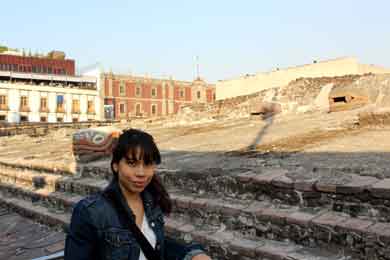
Erica Ledesma studied at Universidad Nacional Autónoma de México (UNAM) through UO program and is working with Dr. Lynn Stephen, Director, Center for Latino/a and Latin American Studies (CLLAS), on original research project.
May 2014—A fifth-year senior, Erica Ledesma is a first-generation Mexican-American, Chicana identified, attending the University of Oregon on a diversity scholarship. An ethnic studies and cultural anthropology major with a minor in Latin American studies, she wants to pursue graduate school.
Although Spanish is her mother language, all of Erica’s formal education has taken place in English beginning with her pre-school days in southern Oregon—until, that is, she spent a year in Mexico City in UO’s new exchange program with the Universidad Nacional Autónoma de México (UNAM).
Erica learned about the new UO exchange program with UNAM during her sophomore year in 2012, when she went to a talk by UO history professor Carlos Aguirre (director, LAS). Attending UNAM had been a dream for her, she says, and she knew right away she wanted to take the opportunity to go there. To apply to the program, she wrote an essay about why she wanted to study at UNAM and what she wanted to study.
After being interviewed for the Study Abroad program, Erica became only the second UO undergraduate to enter the UO-UNAM exchange program, arriving in Mexico City in January 2013. During her first semester, she was the only UO student in the program. Erica says she quickly fell in love with the university and its learning environment. She was able to extend her stay for a second semester, by which time another UO student had arrived. Now, she says, the UO–UNAM exchange program has become very popular and regularly accommodates two students at a time.
Currently a student in Professor Lynn Stephen’s undergraduate research class “LAS 399 Post Study Abroad: How to Do Original Research and Write a Paper,” Erica has been doing research focusing on Mayan women in the context of the war in Guatemala, and how the war challenged and/or transformed their traditional gender roles. Oregon has a significant population of indigenous people of Mexico and Central America, she says, adding that she was blessed recently with the opportunity to interview a Maya Quiche woman who was involved in human rights and exhumations in Guatemala.
Erica looks toward continuing her research on the effects that “la violencia” had in Maya women in Guatemala. “Mayan women’s gender roles have been challenged and changed because of the war,” she says. “Looking at how women’s gender roles have changed before and after the war is very complex; women have had to take on new roles but also it is important to highlight that women have always had a diverse set of roles in the home and in the community. I’m interested in seeing how their lives have been challenged due to the absence of their husbands and the destruction of their families. Spaces for women were created during the war, for example CONAVIGUA, which is an organization dedicated to widows, women whose husbands and children have been killed or disappeared during the war. I want to look at how the war has created and shaped new identities and roles for women, not always chosen but forced.”
Erica wants to research ethnographies from the 1950s and ‘60s that provide detail about Mayan women’s roles prior to the war.
Dr. Stephen’s class, she says, has challenged her and helped her in learning to conduct original research and write a proper research paper. “Dr. Stephen really helps you break down your paper and makes you question what you’re writing,” she says. “Because it’s a small class, we’ve been able to do drafts and get constructive feedback. Often, when you turn in a paper you never see feedback in other classes.”
Erica would eventually like to return to UNAM to do graduate work in Latin American studies, but exchange costs for graduate students are prohibitive. A CAS development proposal currently making the rounds of potential contributors would provide exactly the kind of support Erica needs to continue pursuing her research goals. She would make an excellent candidate for a proposed graduate scholarship for studying abroad at UNAM for which CLLAS is currently fundraising.
